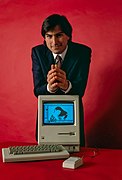Portal:Internet
The Internet PortalSelected articleThe iLoo (short for Internet loo) was a cancelled Microsoft project to develop a Wi-Fi Internet-enabled portable toilet. The iLoo, which was to debut at British summer festivals, was described as being a portable toilet with wireless broadband Internet, an adjustable plasma screen, a membrane wireless keyboard, a six-channel speaker system, and toilet paper embossed with popular web site addresses. The iLoo was also to have an extra screen and keyboard on the outside, and was to be guarded. It was intended as the next in a series of successful initiatives by MSN UK which sought to introduce the internet in unusual locations, including MSN Street, MSN Park Bench and MSN Deckchair. The project was announced by MSN UK on April 30, 2003, and was widely ridiculed before being declared a hoax by Microsoft on May 12. On May 13, another Microsoft press release stated that although the project had not been a hoax, it had been cancelled because it would do little to promote the MSN brand. There has since been speculation as to whether the project was cancelled for fear of being sued by Andrew Cubitt, who had invented the similarly named product "i-Loo". The iLoo was described as a public relations "debacle" by Online Journalism Review. Selected picture The iPhone is a multimedia, Internet-enabled mobile phone designed and marketed by Apple Inc. It has a multi-touch screen with virtual keyboard and buttons. The iPhone was introduced, first in the United States on June 29, 2007 with much media frenzy and then in the United Kingdom, Germany and France in November 2007. It was named Time magazine's Invention of the Year in 2007. News
Wikinews Internet portal
WikiProjects
Did you know (auto-generated) -
Selected biography
Douglas C. Engelbart (born January 30, 1925 in Oregon) is an American inventor of Swedish and Norwegian descent. As a World War II naval radio technician based in the Philippines, Engelbart was inspired by Vannevar Bush's article "As We May Think". Engelbart received a Bachelor's degree in electrical engineering from Oregon State University in 1948, a B.Eng. from UC Berkeley in 1952, and a Ph.D. in EECS from UC Berkeley in 1955. At Stanford Research Institute , Engelbart was the primary force behind the design and development of the On-Line System, or NLS. He and his team at the Augmentation Research Center developed computer-interface elements such as bit-mapped screens, groupware, hypertext and precursors to the graphical user interface. In 1967, Engelbart applied for and later received a patent for the wooden shell with two metal wheels (computer mouse). Engelbart later revealed that it was nicknamed the "mouse" because the tail came out the end. He would also work on the ARPANET, the precursor of the Internet. In later years he moved to the private firm Tymshare after SRI was transferred to the company. McDonnell Douglas took over the copany in 1982, and in 1986 he left the company. As of 2007, he is the director of his own company, the Bootstrap Institute, which founded in 1988 and located in Fremont, California.
General images -The following are images from various internet-related articles on Wikipedia.
Selected quoteMore Did you know...
Main topics
Featured content
CategoriesRelated portalsThings you can do
Associated WikimediaThe following Wikimedia Foundation sister projects provide more on this subject:
Wikipedia's portals |




















































